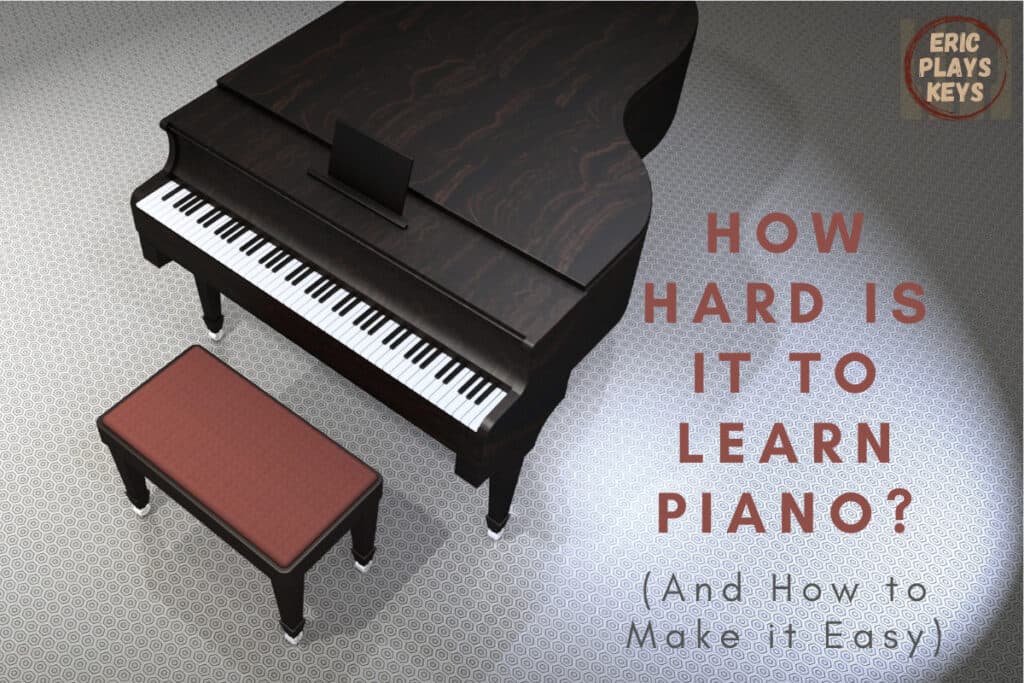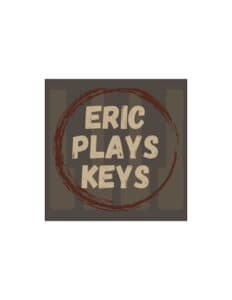
Learning to play the piano is a rewarding journey, although every student faces challenges along the way. Through my own 20 years of experience, as well as my peers, there have been some commonalities on how difficult they found it to learn piano.
Learning to play the piano is difficult, but possible for everyone. Anyone can learn to play as long as they commit to the instrument and the maintain their personal connection to the music they play.
In this article, I’ll dive deeper into what challenges prevent some students from learning piano, and how you can mitigate these issues!
Learning How To Play the Piano Is Moderately Difficult
Although I firmly believe that everyone has the ability to learn to play the piano, it does take a fair amount of effort. This means that those who are not able to consistently put in the effort to learn may give up before they make real progress. By this token, the most difficult part of learning to play is figuring out how you are going to motivate yourself.
A personal connection to the instrument and to music is the best way to maintain motivation. For some students, it is very clear what their personal connection is, and they usually excel at the instrument. Others may not have as much clarity on what exactly they want to learn and why – for these individuals, learning to play will be more challenging.
If you’re not sure which category you fall into, check out my article ‘Should You Learn Piano?‘, which provides some concrete ways that you can use to measure your motivations.
In my experience, I’ve found it much more difficult to progress and learn new material when my heart isn’t in it. This could be because I’m only learning the material for superficial reasons, or because I’m focusing on different things in life for the time being. These ruts have can last a couple months for me, and definitely have made consistent progress more challenging. However, eventually I change my perspective and goals, and learning becomes fun and easy again.
Other difficulties may stem from the time involved, scheduling practice time, and prices associated with equipment and lessons. The logistical items should not be underestimated – a lot of students can get discouraged by the time and money required to learn piano. For those with busy schedules or tight budgets, there are additional hurdles to overcome to carve out some of your bandwidth. With some creativity these items can be overcome, although they can be frustrating.
I’ve always found time to practice, but during busier times in my life my practice routine does fall through the cracks. When I’m practicing less I have less momentum, and it makes it more difficult to stay motivated and make progress. On the flip side, making progress is easy when I’m in a groove.
The last thing I want to mention is the challenges associated with piano lessons, whether it be scheduling, cost, or finding the right teacher. It can be tough to stick to a regular regimen of piano lessons, especially if they are expensive, or you don’t connect with your teacher. On the other hand, a good teacher at a good price will make learning to play much easier. I go a lot more in depth on these issues in my article ‘Are Piano Lessons Worth It?‘.
I was fortunate to have a good piano teacher for many years, who guided me and helped me stay motivated. I think during that time, learning piano was easy for me because I had pre-determined structure and guidance. There were times that I was influenced to play music I didn’t enjoy though – this is always a possibility when taking lessons. I’ve been self-taught for many years now, and I still have periods of ease and periods of challenging times, depending on what I’m learning.
Overall, the key variable that determines the difficulty of learning piano is your own motivation.
How to Overcome Challenges With Learning Piano
The first thing I recommend for all students is to figure out exactly what you want to learn, and why. This may take some soul searching, be quite obvious, or somewhere in between.
You’ll be able to draw most motivation out of pursuing music that you love. Think about the music you listen to the most, or genres that you enjoy. If you’re a fan of live music, check out what the piano/keyboard players are doing and get inspired! Youtube is another great way to check out other piano players and find stuff that resonates with you.
Another good way to stay motivated and connected to piano is to turn your hobby into a lifestyle. This means joining forces with other musicians and groups, attending jam sessions, and performing for your friends and family. When piano is part of your life, it is much more natural to practice regularly. If you’re looking for more ways to incorporate learning piano into your lifestyle, check out my article ‘How to Make Playing Piano a Great Hobby‘.
Personally, I found my motivation to learn piano through my competitive nature and love for music. On the competitive side, I tried to take on challenging pieces and enter into competitions as fuel. I also constantly listen to music, check out piano players on Youtube, attend concerts, and hunt for music I like. Between these two motivations, I’m able to maintain my desire to get better and practice. When I’m in that zone, I don’t find learning material hard at all, despite difficulty level, because the time during practice flies by.
Although I don’t recommend piano lessons for everyone, a good piano teacher can help you avoid setbacks and unnecessary roadblocks. Learning piano isn’t easy, but unlearning bad habits is extremely difficult. In addition, if you find a teacher you get along with, you’ll associate positive emotions with playing. There’s plenty of bad teachers out there, so be careful – but the right teacher can make a world of difference.
Don’t Make Learning Piano Harder Than It Has To Be
The other aspect of learning piano that can be challenging is the stress associated with scheduling practice time, and spending money on equipment and lessons. My advice here is to not pressure yourself unnecessarily – this will cause you to associate learning piano with stress, and it will be very difficult to convince yourself to continue.
It’s also important to identify any external influences you may have – this could include pressure to learn from family, desire to show off, or to prove something to yourself. Although it’s normal to have external influences, without a true desire to connect to the instrument, learning and staying motivated can be very difficult.
You don’t have to take expensive lessons if you don’t want to, you don’t have to practice every day if you don’t want to… you don’t have to do anything if you don’t want to. If learning piano to you means buying a cheap keyboard and practicing once a week, then do it. If it means skipping your scales and exercises and playing Wonderwall over and over again, do it. Learning how to play anything you don’t want to play is a sure-fire way to ensure you hate the instrument and eventually quit.
Is Piano Harder to Learn By Yourself?
Piano is not harder to learn by yourself if you are naturally an independent learner. For those who enjoy structure and working with others, piano is harder to learn by yourself.
This may sound somewhat obvious, but it is a common opinion that piano lessons are required for everyone. I’ve found that this isn’t true, and that there are many piano players (and other musicians) who became very successful teaching themselves. On the other hand, the majority of good players have taken many, many years of lessons.
Lessons are immensely beneficial for those who find good teachers, and it’s safe to say that it’s easier to learn in these cases. However, for students who have not found the right teacher, it may be more difficult to learn because you may be instructed to play music you don’t enjoy and lose your motivation to practice.
Some people are natural dissenters, and naturally resist authority. For these personality types, I recommend teaching yourself to play. If you prefer to learn on your own or work independently in other endeavors, it’s highly likely that this will apply to piano as well. If you’re curious about how to effectively learn piano on your own, check out my complete guide.
Is Piano Harder to Learn at an Older Age?
Piano is not harder to learn at an older age, assuming there’s adequate motivation and commitment. Younger people who are committed to learning do have a slight advantage, but the desire to learn is more predictive of success at any age.
Age can slightly influence peoples’ ability to learn piano, but it is not the most important factor. The motivation to learn far outweighs any other personal characteristic in ability to predict success. Being able to put forth effort to consistently practice and improve is the only thing that really matters, and this can occur at any age. For more information on this topic, check out my article ‘Is It Too Late to Learn Piano?‘.
